 Petzlover
Petzlover Lagotto Romagnolo is originated from Italy but Northern Inuit Dog is originated from United Kingdom. Lagotto Romagnolo may grow 33 cm / 12 inches shorter than Northern Inuit Dog. Lagotto Romagnolo may weigh 32 kg / 70 pounds lesser than Northern Inuit Dog. Lagotto Romagnolo may live 3 years more than Northern Inuit Dog. Lagotto Romagnolo may have less litter size than Northern Inuit Dog. Both Lagotto Romagnolo and Northern Inuit Dog requires Moderate Maintenance.
Lagotto Romagnolo is originated from Italy but Northern Inuit Dog is originated from United Kingdom. Lagotto Romagnolo may grow 33 cm / 12 inches shorter than Northern Inuit Dog. Lagotto Romagnolo may weigh 32 kg / 70 pounds lesser than Northern Inuit Dog. Lagotto Romagnolo may live 3 years more than Northern Inuit Dog. Lagotto Romagnolo may have less litter size than Northern Inuit Dog. Both Lagotto Romagnolo and Northern Inuit Dog requires Moderate Maintenance.
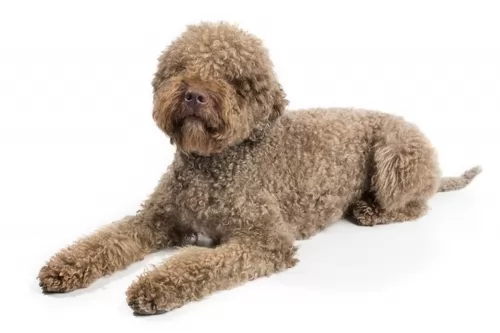 The Lagotto Romagnolo dog, known as the Water Dog of Romagna, and falling into the sporting dog category, is a pure breed dog which comes from the Romagna region of Italy.
The Lagotto Romagnolo dog, known as the Water Dog of Romagna, and falling into the sporting dog category, is a pure breed dog which comes from the Romagna region of Italy.
The dog’s role was that of gun dog and to retrieve water birds. Today he is more used as a truffle hunter in Italy as well as being used for a therapy dog.
In 2015 the Lagotto Romagnolo was accepted by the American Kennel Club into the sporting dog category.
 Looking at the beautiful Northern Inuit Dog, you’ll think that this crossbred dog is a wolf.
Looking at the beautiful Northern Inuit Dog, you’ll think that this crossbred dog is a wolf.
As with many other dogs, there are sometimes different stories regarding their history. It was in the 1980's that founder of the breed, Eddie Harrison, bred a number of mixed-breed rescue dogs with Siberian Huskies, German Shepherds and Alaskan Malamutes to produce the early Northern Inuit dogs. This is a dog that closely resembled a wolf in looks but which has the more companionable characteristics of the domesticated dog.
The dog is only recognized by its own independent breed club, but by none of the other major kennel clubs.
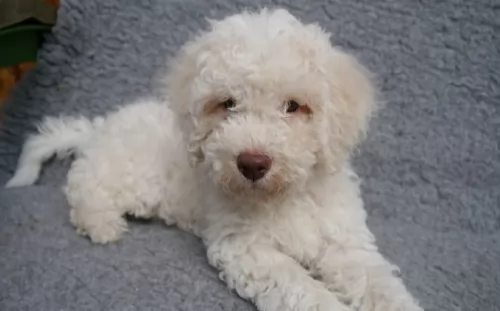 The Lagotto Ramagnolo is a medium sized dog where both males and females stand anything between 41 and 48cm and weigh 11 to 16kg.
The Lagotto Ramagnolo is a medium sized dog where both males and females stand anything between 41 and 48cm and weigh 11 to 16kg.
He is well proportioned and muscled, he has large yellow or brown eyes with a black or brown/pinkish nose, floppy, rounded ears and a tail which is left long these days.
The Lagotto Romagnolo has a waterproof double coat with a woolly texture and which hardly sheds, putting him as being hypoallergenic.
The coat can be in a number of different colors such as cream, grey, white, apricot, brown or tan. The face of the dog has a bit of a beard as well as noticeable bushy eyebrows.
Because the Lagotto is a sporting breed, he has had to call on all his senses to retrieve water birds. Good eyesight, sharp listening skills and an excellent sense of smell makes him the ideal gun dog but he also makes a loyal family pet.
He makes a good playmate for children and he happily gets on well with other pets in the home. Being an intelligent dog, he is easy to train too.
The sporting past of his has made it that he isn’t a couch-potato type of dog and he will require mental- and physical stimulation. His role as gun dog meant that he was required to retrieve birds in water, and he is an excellent swimmer and will happily plunge into water to join you in a swim.
Have him trained and socialized and you’ll find him tuned in to obeying your commands. Because of his smallish size, the Lagotto can adjust well to life in the city or in the countryside, just so long as he still receives his full quota of exercise.
 Friendly, calm and gentle, the Northern Inuit Dog is a crossbreed, described as a medium to large sized dog that stands at roughly 58– 81cm in height, male and female, and weighs in the region of 25–48kg.
Friendly, calm and gentle, the Northern Inuit Dog is a crossbreed, described as a medium to large sized dog that stands at roughly 58– 81cm in height, male and female, and weighs in the region of 25–48kg.
He has a double coat in typical wolf shades of grey, white, black and cream. He is regarded as a moderate shedder. The ears are erect, the face bright, intelligent and alert and the tail long, bushy and straight.
The Northern Inuit dog is independent, strong-willed and stubborn, and if you want to own one of these dogs, your dog will respond well if you are firm, fair, strong, kind and consistent. This is because the dog is stubborn, sharp, independent and intelligent.
The owner of such a dog must be a firm leader. Training and socialization should start when the dog is still young. He is good with kids, being playful and affectionate with them.
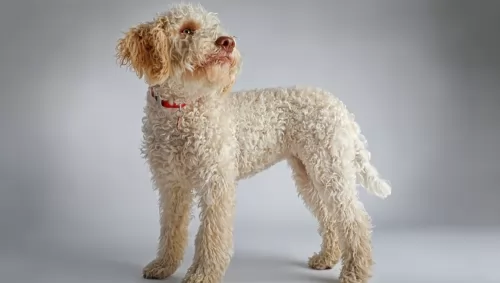 Many dog lovers appreciate that the Lagotto Romagnolos is looked upon as an allergy-friendly dog with his non-shedding coat.
Many dog lovers appreciate that the Lagotto Romagnolos is looked upon as an allergy-friendly dog with his non-shedding coat.
Being a medium sized dog, he is manageable too. Add to that excellent characteristics such as being amicable, friendly and loving. Training him some important, basic commands won’t be difficult either and you can add in intelligence to his list of good qualities.
As loving dogs, they are dedicated to their families, getting on well with children in the home as well as with other pets. He is a social dog and just longs to be a treasured member of the family like anybody else.
Count him in with all your activities and you’re going to have a one-in-a-million undemanding and contented canine friend.
 It’s not surprising that people who love wolves would want a similar looking pet. However, they also want this wolf-like dog to be a friend and companion. This is precisely what they get with the beautiful Northern Inuit dog.
It’s not surprising that people who love wolves would want a similar looking pet. However, they also want this wolf-like dog to be a friend and companion. This is precisely what they get with the beautiful Northern Inuit dog.
With his bright, alert face, the Inuit is actually a calm, gentle dog, bonding closely with his human family and not showing any aggression.
Intelligent and social, and somewhat stubborn, when you provide him with the home he deserves, you’ll see that this beautiful creature can be relied on to be a wonderful family pet.
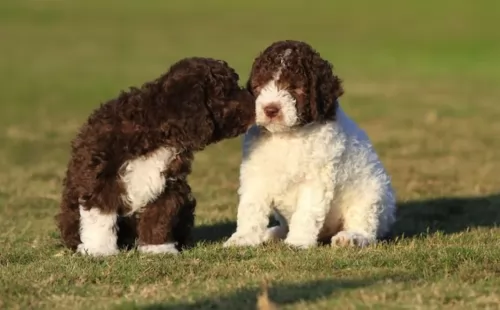 Lagotto live roughly 16 years with the best food, exercise and loving environment. Some health issues may well crop up, though unlikely, but it is good to be aware of them.
Lagotto live roughly 16 years with the best food, exercise and loving environment. Some health issues may well crop up, though unlikely, but it is good to be aware of them.
You hear the words ‘Hip dysplasia’ being bandied about a lot in the world of dogs because it is such a common dog ailment. Your dog can’t be cured but there are a range of management options that will ensure your pet remains as comfortable as possible.
It is such a common joint disease where the hips partially dislocate. Without veterinary intervention, it can be debilitating and painful. It is essentially a genetic condition but diet and environmental factors can come into play too.
You don’t want your pet putting on too much weight as this puts extra strain on the joints.
Your dog has loss of function because of the degeneration of cells or tissues. The illness affects different parts of the brain in dogs. You’ll notice a mild tremor of the head and uncoordinated movements. Your vet will want a history of your pet’s health as well as lab tests.
 There are some genetic problems with this dog breed, although with good care, you are highly unlikely to see your dog with them.
There are some genetic problems with this dog breed, although with good care, you are highly unlikely to see your dog with them.
Some of these are hip dysplasia and epilepsy.
Hips are always a worrisome aspect with dogs as it can bring on lameness. There are some things that can be done to reduce the incidence of hip dysplasia.
Joint laxity in dogs occurs when the head of the femur doesn’t fit into the acetabulum properly. This could be the result of several things such as the dog being overweight, injury or something else.
Epilepsy in dogs is a chronic condition that results in seizures. This neurological disorder is actually a life-long disease, occurring when there is abnormal electrical activity in the brain and which changes a dog’s behavior.
Some breeds are more predisposed to epilepsy than others but you will need to get your dog to the vet when you see your pet jerking uncontrollably. Most of these epileptic fits happen without warning, they last a few seconds to a minute or so and stop on their own.
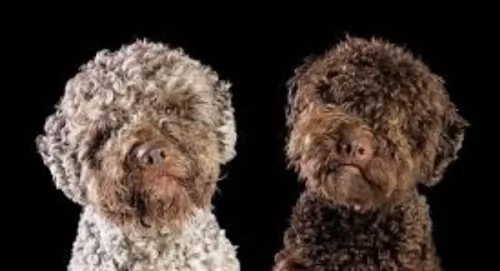 Not everyone agrees with how to take care of the Lagotto’s rough, waterproof coat of thick curls. The coat doesn’t shed much but it can pick up grass and small twigs easily. Unless brushed out at least 2 or 3 times a week, the coat can become matted and unruly. For many the coat needs to be trimmed regularly.
Not everyone agrees with how to take care of the Lagotto’s rough, waterproof coat of thick curls. The coat doesn’t shed much but it can pick up grass and small twigs easily. Unless brushed out at least 2 or 3 times a week, the coat can become matted and unruly. For many the coat needs to be trimmed regularly.
The Lagotto needs plenty of exercise. His hunting and retrieving past has given him a natural urge to retrieve and he loves going after every ball you throw him. He will also love to join you on your daily walks and it gives him the chance to sniff around. With swimming being added in, this dog is your true sporting buddy.
Make sure you feed your Lagotto the very best quality food there is to ensure his well-being and longevity. If you're unsure about whether he is getting in all the necessary vitamins and minerals with his food, speak to a dog expert as good food is key to a happy, healthy dog.
 It’s no longer cheap caring for a dog – just like with a child, by bringing a dog into your home, you have a responsibility to care for it.
It’s no longer cheap caring for a dog – just like with a child, by bringing a dog into your home, you have a responsibility to care for it.
If you bring a puppy into your home, you will need to feed him 4x a day. If you feed him commercially manufactured food it will need to be specially formulated for puppies. You will have to read on the packaging to make sure you get the right food.
Later on your pet can start having one or two meals a day. Two smaller meals is best as then he doesn’t gobble up his food too fast which can lead to a life-threatening condition known as bloat. Home-made food is always a welcome treat for your pet, but keep it simple and consistent. Boiled chicken, brown rice or pasta and some cooked vegetables such as carrots, sweet potatoes and spinach chopped up and added to his dry kibble can offer him some variety from time to time as well as also adding in some raw meat when you get the chance. He must always have access to fresh, cool water.
Your puppy will be due at the vet for his first vaccinations. Your puppy's first vaccination will usually be at about 8 weeks of age.
Your new pet will require a warm, dry, comfortable place to sleep and to retreat to.
You will need to provide him with chewy toys to stimulate him both mentally and physically.
You will need to exercise your pet – nice long walks, ball- and rope games etc.
Nearly every dog sheds, and the Northern Inuit will require you brushing him twice a week to remove all those loose hairs. During the brushing session, check him over for fleas and ticks and run your hands over him and make sure there are no unusual lumps on his body.